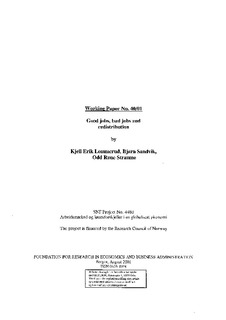| dc.description.abstract | We analyse the question of optimal taxation in a dual economy, when the government is concerned about the distribution of labour income. Income inequality is caused by the presence of sunk capital investments, which creates a `good jobs` sector due to the capture of quasi-rents by the trade unions. We find that whether the government should subsidise or tax investments is crucially dependent on union bargaining strength. If unions are weak, the optimal tax policy implies a combination of investment taxes and progressive income taxation. On the other hand, if unions are strong, we find that the best option for the government is to use investment subsidies in combination with either progressive or proportional taxation, the latter being the optimal policy if the government is not too concerned about inequality and if the cost of income taxation is sufficiently high. | en |
